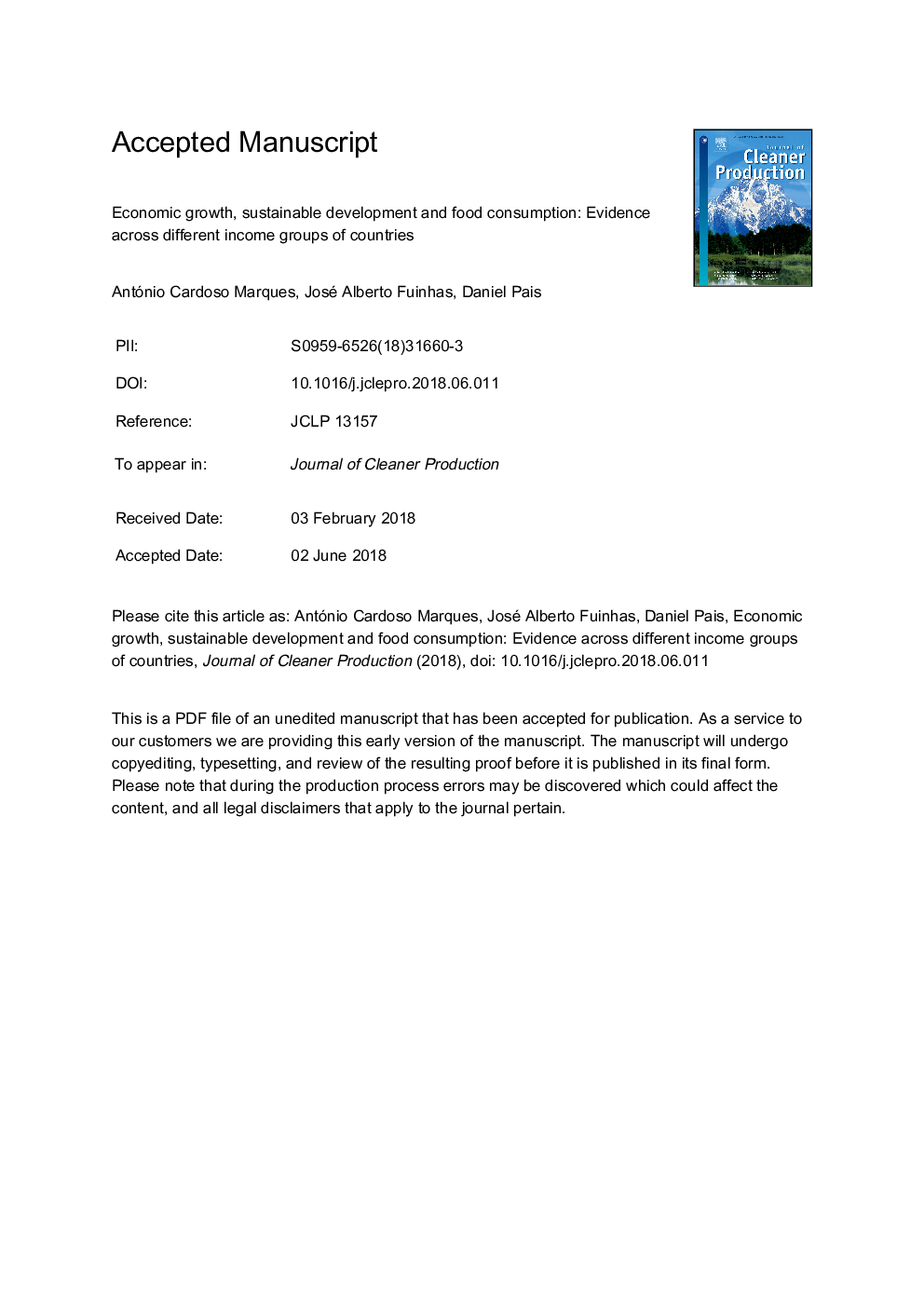| کد مقاله | کد نشریه | سال انتشار | مقاله انگلیسی | نسخه تمام متن |
|---|---|---|---|---|
| 8093775 | 1522057 | 2018 | 35 صفحه PDF | دانلود رایگان |
عنوان انگلیسی مقاله ISI
Economic growth, sustainable development and food consumption: Evidence across different income groups of countries
ترجمه فارسی عنوان
رشد اقتصادی، توسعه پایدار و مصرف مواد غذایی: شواهد در کشورهای مختلف درآمد مختلف
دانلود مقاله + سفارش ترجمه
دانلود مقاله ISI انگلیسی
رایگان برای ایرانیان
کلمات کلیدی
ترجمه چکیده
با توجه به رشد جمعیت بالا و درآمد دهه های آتی، منجر به افزایش تقاضای جهانی غذا خواهد شد. محصولات دام مانند گوشت با این روند در ارتباط هستند، اما همچنین با تاثیرات بر محیط زیست و سلامت عمومی، از تخریب زمین و آب، انتشار گازهای گلخانه ای و خطرات بالقوه بیماری های غیر قابل انتقال مرتبط است. این روند موجب شک و تردید در مورد پایداری صنایع غذایی می شود و بنابراین برای حل مشکل لازم است. چگونه برای تغذیه مردم جهان بدون به خطر انداختن نسل های کنونی و آینده. ادبیات نشان می دهد که مصرف گوشت به دلیل محیط زیست و جمعیت جهانی کاهش می یابد، با این حال بدون درنظر گرفتن اثراتی که این کاهش در اقتصاد به وجود خواهد آورد. با الهام از این حقایق، این مقاله تجربی از تعاملات بین مصرف مواد غذایی، رشد اقتصادی و توسعه پایدار (اندازه گیری شده توسط شاخص رفاه اقتصادی پایدار) تجربی را تحلیل می کند. به طور خاص در مقاله اثر تأثیر مصرف مواد غذایی بر اقتصاد را ارزیابی می کند. تجزیه و تحلیل اقتصاد سنجی مدل مدل لاغری توزیع خودکار را برای 77 کشور اعمال می کند که بیشتر از گروه های درآمدشان از 1995 تا 2013 به چشم می خورد. یافته ها حاکی از آن است که مصرف گوشت تاثیر زیادی بر رشد اقتصادی و توسعه پایدار با توجه به گروه های درآمد متفاوت دارد. با این وجود، بین رشد اقتصادی و توسعه پایدار آشکار است زیرا مصرف گوشت اثر متفاوتی بر روی آن دارد. بنابراین، برای فهمیدن اینکه چگونه به ترویج پایداری، یعنی کاهش اضطراب محیط زیست و بیماری های مزمن سلامت، بدون ایجاد خطر برای رشد اقتصادی، بسیار مهم است.
موضوعات مرتبط
مهندسی و علوم پایه
مهندسی انرژی
انرژی های تجدید پذیر، توسعه پایدار و محیط زیست
چکیده انگلیسی
Considering that high population and income growths will lead the coming decades, an increase in global food demand is expected. Livestock products, such as meat, are closely related to this trend, but also associated with impacts on the environment and public health, from land and water depletion, to greenhouse gases emissions and higher risks of non-communicable diseases. This trend raises doubts about the sustainability of the food industry and thus a solution is needed for the problem. How to feed the world population without compromising present and future generations. The literature suggests that meat consumption should be reduced for the sake of the environment and global population, however without considering the effects that such reduction would have on the economy. Inspired by these facts, this paper empirically analyses the interactions between food consumption, economic growth and sustainable development (measured by the Index of Sustainable Economic Welfare). More specifically the paper assesses the effect that food consumption has on the economy. The econometric analysis applies the Autoregressive Distributed Lag model for 77 countries, further distinguished by their income group, from 1995 to 2013. The findings support that meat consumption has different impacts on economic growth and sustainable development considering different income groups. However, there is an evident dilemma between economic growth and sustainable development since meat consumption has contradictory effects on each. Thus, it is crucial to understand how to promote sustainability, i.e., reducing the environmental externalities and chronic health diseases, without compromising economic growth.
ناشر
Database: Elsevier - ScienceDirect (ساینس دایرکت)
Journal: Journal of Cleaner Production - Volume 196, 20 September 2018, Pages 245-258
Journal: Journal of Cleaner Production - Volume 196, 20 September 2018, Pages 245-258
نویسندگان
António Cardoso Marques, José Alberto Fuinhas, Daniel Francisco Pais,
